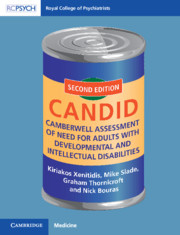Book contents
- Camberwell Assessment of Need for Adults with Developmental and Intellectual Disabilities
- Camberwell Assessment of Need for Adults with Developmental and Intellectual Disabilities
- Copyright page
- Contents
- Acknowledgements for the First Edition
- Acknowledgements for the Second Edition
- Abbreviations
- Chapter 1 Introduction
- Chapter 2 Needs Assessment in Intellectual Disabilities Mental Health Services
- Chapter 3 Development and Use of CANDID
- Chapter 4 Using CANDID-S
- Chapter 5 Using CANDID-R
- Chapter 6 Training for CANDID
- Chapter 7 Guidance on Rating
- Book part
- References
- Index
Chapter 5 - Using CANDID-R
Published online by Cambridge University Press: 15 February 2021
- Camberwell Assessment of Need for Adults with Developmental and Intellectual Disabilities
- Camberwell Assessment of Need for Adults with Developmental and Intellectual Disabilities
- Copyright page
- Contents
- Acknowledgements for the First Edition
- Acknowledgements for the Second Edition
- Abbreviations
- Chapter 1 Introduction
- Chapter 2 Needs Assessment in Intellectual Disabilities Mental Health Services
- Chapter 3 Development and Use of CANDID
- Chapter 4 Using CANDID-S
- Chapter 5 Using CANDID-R
- Chapter 6 Training for CANDID
- Chapter 7 Guidance on Rating
- Book part
- References
- Index
Summary
Step by step description of using the CANDID-R as a needs assessment tool is provided. This includes suggestions on what CANDID-S can be used for (as an audit and research tool, as well as as an aid for a CANDID-S user to familiarise themselves with the approach) and who can use CANDID-R (no formal training is required and can be used by any person with experience in working with adults with intellectual disabilities and mental health problems). Then, the question of who should be interviewed is addressed, whilst highlighting the importance of assessing needs of the person from three perspectives: that of the person being assessed, their informal carer and the staff involved in their care. A description is provided as to how the instrument is used by way of a semi-structured interview using trigger questions in each domain, to initiate discussion. As with CANDID-S, a timeframe of 4 weeks is used. In addition, the rating of informal and formal help and satisfaction with the latter is described. Thus, the interview with each respondent takes typically 20–30 minutes. Finally, the approach to recording the need ratings and summary scores is descibed: one recording sheet for each interview or record ratings on CANDID-R.
- Type
- Chapter
- Information
- Camberwell Assessment of Need for Adults with Developmental and Intellectual DisabilitiesCANDID, pp. 14 - 17Publisher: Cambridge University PressPrint publication year: 2021

